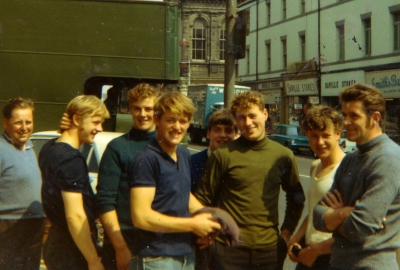Leslie Tait
Here Leslie Tait, chairman of Shetland’s Fishing Association now a lecturer in Fisheries and Seamanship at the NAFC recalls his lifelong interest in fishing – which started at a very early age. Fishing was all we knew growing up on the island of Burra in the 1960s – and it was in my blood. My dad and uncles all had shares in fishing boats and, as a young boy, I couldn’t wait for the school summer holidays as it meant that I’d get the chance to go off fishing for up to two weeks.
As was typical of many boys in Burra at the time, I would wait down at the pier with my oilskins (which my grandfather had made himself using cloth dipped in a tar and egg white solution) to see if any of the fishing boats would take me off. The first time I went away I was just 12 years old – and it was with my uncle on the Brighter Dawn.
On one of these occasions I went off to the haaf on the Ocean Reaper with skipper Geordie Hunter. It was in the evening, about 10.30pm, when we shot our nets. I then dropped the hand line hoping to catch an olick – there was no rod and reel in those days – just a ball of twine which was in an awful tangle. The line belonged to Sammy Christie and he was helping me to clear it while I was lowering it away. After some time the line appeared to come fast and it would not lower away nor could I pull it in. I told Sammy that it must be fast in the bottom but he informed me there was no way the line was at the bottom as we were just at half water. The line then zipped away from me and I could no longer hold it, Sammy then took hold with me but to no avail – it kept pulling away. Eventually we went to get help from the rest of the crew – as it seemed obvious to us that we had caught a huge fish on our line. After running (letting out) and pulling the line several times we eventually saw a massive white swirl under the boat – and it was the underside of a huge porbeagle shark (a member of the mackerel shark).
The experience was a pretty exciting one, especially when the shark started to do, what I thought at the time was the death roll. The line got wrapped around its tail so we could not get its head up to bring it onboard. Eventually the shark gave one almighty swipe of its tail, broke the nylon line, and swam away. As the Ocean Reaper was an open sided boat, you felt very close to the elements onboard, and the experience filled me with both terror and exhilaration. It’s something that left a lasting impression on me as a young boy and is something that I can still recall vividly.
The incident didn’t put me off though and by the age of 15, having left school, I went straight to the fishing full time. My first job was as the cook onboard the seine-netter Brighter Dawn – which was typical as a starting point. My mother had taught me the rudiments of cooking and all I can say is god help the crew! Usually I’d cook up soups, stews and fish. On occasion we stopped at Foula where we found dunter eggs, and I served those up for the crew. I remember once that I thought I would treat the crew to doughboys, as my mother made them, but I had only seen the finished article on the table. I made them about the size of a small snowball and filled the pot then went out to help with gutting the catch while waiting for them to cook. Shortly after I heard a noise from the galley and when I went to take a look the pot lid was sitting on top of a huge mound of dough about 12 inches from the top of the pot. Alas I had not experienced the effects of self-raising flour. I could have fed a multitude.
Accommodation was pretty cramped to say the least. The Brighter Dawn was a 60ft seine net fishing boat. There were seven crew and we all shared the same sleeping facilities. In those days everyone smoked pipes and cigarettes and there were times when you could barely see across the cabin for all the smoke.
As well as cooking I would help out on deck sometimes stowing the seine-net ropes, or gutting the catch. They were physically hard times – there was no deck shelter or whale backs or hydraulics to haul the nets. We were exposed to the elements with no life jacket and it meant that the crew had to work closely together to keep safe and bring home the catch. We relied on the shipping forecast for the weather, which was not always accurate, but often this meant that we tended to take fewer risks. They were good times – and by the age of 17 I knew that I wanted a life at sea – and so I decided to take out shares in the Sirius. I have enjoyed a life associated with fishing ever since.

